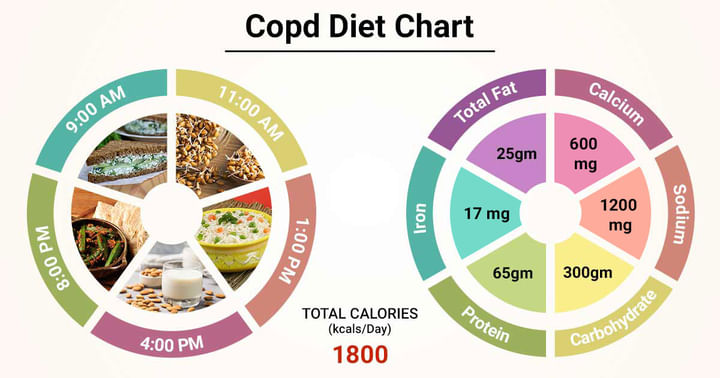Diet Chart For copd
Last Updated: Jan 20, 2025
About
Chronic Obstructive Pulmonary Disease or COPD mandates a number of checks in a patient’s eating and lifestyle habits in order to conserve energy and optimise lung capacity and function. When individuals are diagnosed with COPD, it zaps out energy to even breathe and that is why it is of utmost necessity that COPD patients maintain a well-balanced healthy diet which can preserve energy and give the body the fuel to fight infection.
Following are the key constituents of a COPD diet:
- Staying balanced – A healthy diet is one that is balanced. COPD patients are advised to include fruits and vegetables, lean proteins, whole grains and dairy products in their diet regiment.
- Foods to avoid – Salt intake should be minimised and avoided as too much sodium in your body can cause water retention which can lead to difficulties in breathing. Caffeine from chocolate, coffee and sodas should be avoided as well because it may hamper with your COPD medication. The consumption of friend and spicy foods is also discouraged as this can cause gas, indigestion and breathing problems.
- More meals – COPD patients are advised to have small frequent meals instead of a few large ones in order to mitigate shortness of breath.
- Watch your weight – It is inadvisable for COPD patients to be either overweight or underweight. Being underweight leads to quicker exhaustion and being overweight makes breathing more difficult as your heart and lungs have to work harder.
Diet Chart
| Sunday | |
| Breakfast (8:00-8:30AM) | cottage Cheese sandwich(2 slice bread) + 1 cup skimmed milk. |
| Mid-Meal (11:00-11:30AM) | 1 cup boiled green gram sprouts |
| Lunch (2:00-2:30PM) | Veg pulav rice 1 cup+ 1 cup Soya Chunk curry |
| Evening (4:00-4:30PM) | 1 cup Almond milk |
| Dinner (8:00-8:30PM) | 2 chapatti + Ladies finger subji 1 cup |
| Monday | |
| Breakfast (8:00-8:30AM) | chappati-3+ Paneer subji 1 cup |
| Mid-Meal (11:00-11:30AM) | 1 cup grilled vegetables with Cottage cheese. |
| Lunch (2:00-2:30PM) | 2 Roti+ Mushroom curry 1 cup + 1 cup moong dal |
| Evening (4:00-4:30PM) | 1 apple + 1/2 cup cottage cheese |
| Dinner (8:00-8:30PM) | 2 chapatti + arhar dal 1 cup |
| Tuesday | |
| Breakfast (8:00-8:30AM) | Soy flour Uthappam 2 + coconut chutney + 1 glass skim milk. |
| Mid-Meal (11:00-11:30AM) | 1 cup boiled black chana |
| Lunch (2:00-2:30PM) | 1 cup rice + Kidney beans curry 1 cup + cucumber salad+ cottage cheese vegetable 1 cup. |
| Evening (4:00-4:30PM) | Brown rice flakes poha with nuts 1 cup |
| Dinner (8:00-8:30PM) | 2 paneer stuffed capsicum +2 chapatti |
| Wednesday | |
| Breakfast (8:00-8:30AM) | Paneer Paratha 2+ 1 cup skim milk |
| Mid-Meal (11:00-11:30AM) | 1 cup grilled paneer |
| Lunch (2:00-2:30PM) | 2 chapati + Black eyed beans curry 1 cup + cucumber salad |
| Evening (4:00-4:30PM) | 1 cup soy milk |
| Dinner (8:00-8:30PM) | Broken wheat upma 1 cup+ 1/2 cup green beans subji |
| Thursday | |
| Breakfast (8:00-8:30AM) | Mushroom Paratha 2 +1 cup skim milk |
| Mid-Meal (11:00-11:30AM) | 1 cup boiled green gram sprouts |
| Lunch (2:00-2:30PM) | 1/2 cup rice + 1-2 chappati + Chick peas spinach curry 1/2 cup + Snake guard subji 1/2 cup |
| Evening (4:00-4:30PM) | 1 cup boiled channa |
| Dinner (8:00-8:30PM) | 2 chapatti+ 1 cup mix veg curry |
| Friday | |
| Breakfast (8:00-8:30AM) | Moong dal cheela with paneer filling- 2 + 1 cup skim milk |
| Mid-Meal (11:00-11:30AM) | 1 cup boiled black chana |
| Lunch (2:00-2:30PM) | 1 cup rice+ Soya chunk curry1/2 cup+ Ladies finger subji 1/2 cup |
| Evening (4:00-4:30PM) | 1 glass almond milk |
| Dinner (8:00-8:30PM) | 2 chappatti+Ridge guard subji 1 cup |
| Saturday | |
| Breakfast (8:00-8:30AM) | Wheat dosa-2 + Tofu curry 1 cup |
| Mid-Meal (11:00-11:30AM) | 1 cup grilled vegetables with Cottage cheese. |
| Lunch (2:00-2:30PM) | 1/2 cup rice+ 1-2 chapatti + Kidney beans curry 1/2 cup + Palak paneer subji 1/2 cup |
| Evening (4:00-4:30PM) | 1 cup boiled black eye beans |
| Dinner (8:00-8:30PM) | Broken wheat upma 1 cup+ 1/2 cup green beans subji |
Food Items To Limit
Sulfites are a type of preservative that may worsen COPD Sulfites are found in wine, dried fruits, pickled food, maraschino cherries, shrimp, and bottled lemon and lime juice. Eating large meals or foods that cause gas puts pressure on your diaphragm, especially if you have acid reflux. This may cause chest tightness and trigger asthma flares. These foods include beans, cabbage, carbonated drinks, onions, garlic, and fried foods. Although it’s rare, some people with asthma may be sensitive to salicylates found in coffee, tea, and some herbs and spices. Chemical preservatives, flavorings, and colorings are often found in processed and fast food. Some people with COPD may be sensitive or allergic to these artificial ingredients. People with food allergies may also have asthma.
Do's And Dont's
Do's:
- Eat adequate high carbohydrate meals every day to keep glycogen stores full and make most of your training sessions.
- Allow 3-4 hours digetion time for a large meal, 2-3 for smaller meal, 1-2 for blended or liquid meals and less than one hour for smaller snacks.
- If you eat less than one hour before the event be sure to snack on any tried and truelow fat high carbohydrate snack.
Dont's:
- Dehydrate your body.
- Maintain proper balance of intake and output.
- Balance your protein and carb intake wisely.
- Alcohol & smoking should be avoided totally.
- Avoiding contact with others would prevent the spread of pathogens that could cause other people to contract the disease as well.
Food Items You Can Easily Consume
- Cereals & Cereal products: Rice, parboiled rice, whole wheat flour, wheat flour, brown bread, Bengal gram daal, chickpeas, kidney beans, arhar daal, toor daal.
- Vegetables & Fruits: Bell peppers, broccolli, carrots, snake gourd, tapioca, yam, taro, methi leaves, coriander leaves, lotus stems, spring onions, onions, garlic, ginger, tomato, mango, lemons, oranges, berries, grapes, pears, pomegranate, kiwis, cherries.
- Milk & Milk products: Curd, toned milk, paneer, custard, payasam, ghee, lassi, etc.
- Meat, Fish & Poultry: Chicken (fowl & lean), sweet water fishes.
- Nuts, Oils & Seeds: Almonds, walnuts, vegetable oil, mustard oil, olive oil.
References
- Efthimiou J, Fleming J, Gomes C, Spiro SG. The effect of supplementary oral nutrition in poorly nourished patients with chronic obstructive pulmonary disease. Am Rev Respir Dis. 1988 May 1;137(5):1075-82. [Cited 01 July 2019]. Available from:
- Brug J, Schols A, Mesters I. Dietary change, nutrition education and chronic obstructive pulmonary disease. Patient education and Counseling. 2004 Mar 1;52(3):249-57. [Cited 01 July 2019]. Available from:
- Tabak C, Smit HA, Heederik D, Ocke MC, Kromhout D. Diet and chronic obstructive pulmonary disease: independent beneficial effects of fruits, whole grains, and alcohol (the MORGEN study). Clinical & Experimental Allergy. 2001 May;31(5):747-55. [Cited 01 July 2019]. Available from:
Table of content
Find Dietitian/Nutritionist near me
Ask a free question
Get FREE multiple opinions from Doctors



